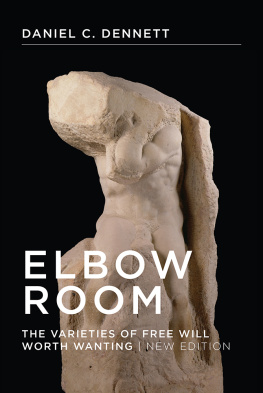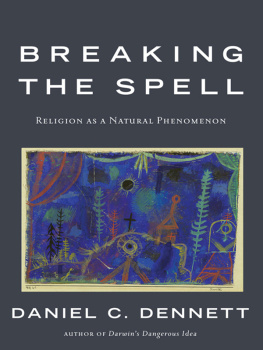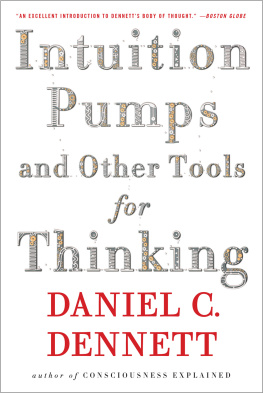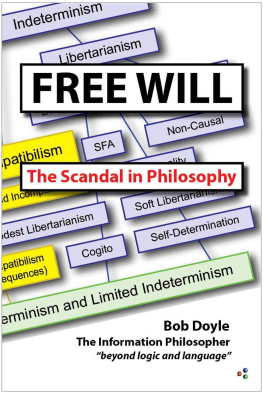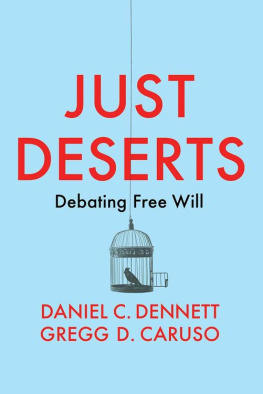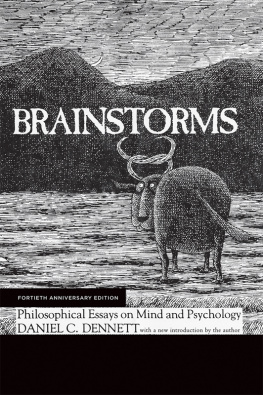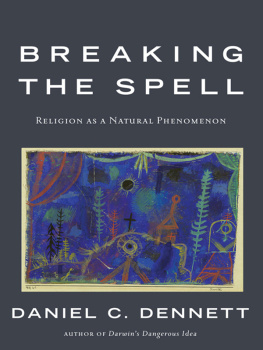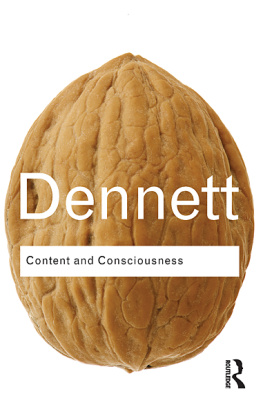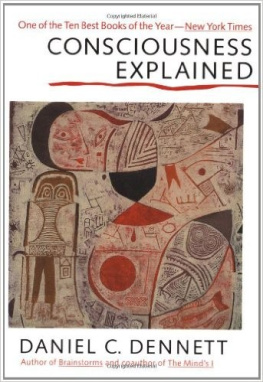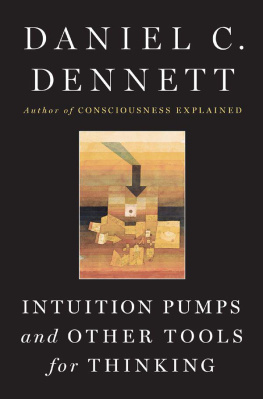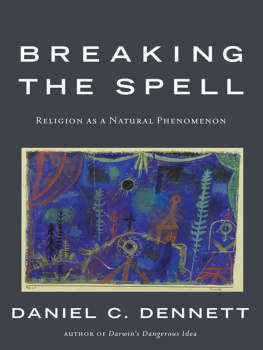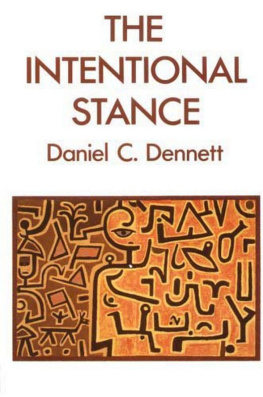Elbow Room
Elbow Room
The Varieties of Free Will Worth Wanting
Daniel C. Dennett
The MIT Press
Cambridge, Massachusetts
London, England
1984, 2015 Daniel C. Dennett
All rights reserved. No part of this book may be reproduced in any form by any electronic or mechanical means (including photocopying, recording, or information storage and retrieval) without permission in writing from the publisher.
Library of Congress Cataloging-in-Publication Data
Dennett, D. C. (Daniel Clement)
Elbow room : the varieties of free will worth wanting / Daniel C. Dennett.New edition.
p. cm.
A Bradford Book.
Includes bibliographical references and index.
ISBN 978-0-262-52779-8 (hardcover : alk. paper)
ISBN 978-0-262-33204-0 (retail e-book)
1. Free will and determinism. I. Title.
B945.D393S94 2015
123.5dc23
2014048120
Dedicated to the memory of Gilbert Ryle
Preface to the New Edition
When I published Elbow Room in 1984, I supposed it would be the only book on free will I would ever feel the need to publish, and I have to say that after thirty years, the book still strikes me as a very effective, if hardly conclusive, case for compatibilism. The varieties of free will worth wanting, the varieties that underwrite moral and artistic responsibility, are not only not threatened by advances in (neuro-)science; they are distinguished, explained, and justified in detail. There are other readily definable varieties of free will that are incompatible with what we now know about how human beings control their behavior, such as libertarian freedom or agent causation. They dont, and cant, exist, but although some philosophers still take them seriously, they are of only historical interest, like mermaids and leprechauns.
It is fair to say that I underestimated the persistence of some of the ideas I sought to dismantle and discredit in the 1980s. Although compatibilism along the lines of the view defended in Elbow Room is still probably the majority view among philosophers, there are doughty champions of all the other isms still defending their views in philosophical books and journal articles. More than a little disconcerting is the fact that some eminent scientists have recently turned their attention to free will, and confidently declared it an illusion. Among them are the physicist Stephen Hawking, the evolutionary biologist Jerry Coyne, and the cognitive scientists Wolf Singer, Chris Frith, and Paul Bloom, and they have focused on these minority conceptions of free will, ignoring compatibilism instead of considering it, or else gratefully accepting Kants infamous dismissal (a wretched subterfuge) without further discussion.
Why? Why do these scientists concentrate on the least scientifically informed conceptions of free will? I have interrogated some of them and it turns out that they are driven by dismay with our current punishment practices (a dismay we should all share) and by the hunch that if only we could get rid of that antiquated myth about free will, we could banish moral responsibility and replace punishment (which they do not distinguish from retribution) with something better, but something they seldom try to articulate. It is relatively easy for them to show that the idea of an ego or soul miraculously opting (with no causal antecedents) for one action or another is a fantasy that science must reject. That, they think, does away with free will, and leaves the door wide open for a revolution in our treatment of the antisocial people whose actions need to be curtailed. They think the details of that legal and ethical reform are best left to experts on law and ethics, so they just gesture in the direction of a skimpily imagined future without the terrible and obsolete burden of moral responsibility. If only their modesty about their expertise extended to their analyses of the pivotal concept of free will!
It is also fair to say, I think, that the conception of free will I defend in Elbow Room is less an evenhanded analysis, and more a reform, of our everyday conception than I was willing to admit at the time. In the 1980s, Ordinary Language Philosophy had already plummeted from its dominant position in the 1960s, but I, an appreciative student of Ryle, was still engaged in the enterprise of trying to make sense of what we ordinarily say before dismissing it as mythic nonsense. Indeed I am still engaged in that project, an essential component, I believe, of the philosophers task, as pronounced by Wilfrid Sellars in Philosophy and the Scientific Image of Man (1962).
The aim of philosophy, abstractly formulated, is to understand how things in the broadest possible sense of the term hang together in the broadest possible sense of the term.
The tacit assumptions built into ordinary language do not provide a bulwark against the imperialist encroachments of scienceas some zealots supposed fifty years agobut they are in force, setting the terms, at the outset of any investigation, scientific or otherwise. What are things made of? is not couched in scientific language, but expresses a curiosity that science must attempt to satisfy, directly or indirectly. So you need to understand the things (in that broadest possible sense) we ordinarily take to be real if you aspire to show how they hang together with the things science postulates. Understanding always invokes the principle of charity (to cite my other mentor, Quine), so there is never a bright line between pure analysis and reform. Making sense of something is making the best sense of it you can find, and that may ofteneven typicallylead you to clean up an everyday conception, removing its excess baggage, the scars of its history, in the course of analyzing it.
That is what I took myself to be doing in Elbow Room, saving everything that mattered about the everyday concept of free will, while jettisoning the impediments. If many folk were unpersuaded by my housecleaning efforts, one could with some justice conclude that I had been trying to salvage the unsalvageable, and should give it up as a lost cause. My second book on the topic, Freedom Evolves (2003), persisted in the effort to save both the term and the concept, but in the light of the more recent discussions about free will I have been tempted to give in to this recommendation, and in unpublished lectures I have tentatively explored abandoning the term free will altogetheron the grounds that it simply has too many unfortunate and apparently irresistible connotations to survive reformwhile persisting with the topic: the conditions underlying the moral responsibility of normal adult human beings.
Setting aside my wavering allegiance to the term free will, then, there is nothing in the substantive claims and arguments in Elbow Room that I would wish to recant today. On the contrary, I think the book has significant contributions to make to the contemporary discussions. For instance, I believe I was the first philosopher to introduce control theory and its stripped-down conception of autonomy to the investigation, and also the first to discuss the importance of deterministic chaos as an entirely acceptable substitute for indeterministic randomness. More recent presentations of these topics do not suggest any revisions in my accounts are in order. I also think my discussion of Austins putt, and his mistaken emphasis on conditions as they precisely were (this vol., p. 160), expanded by Christopher Taylor and me, and also in Freedom Evolves, contains an unanswered and unanswerable objection to the most central assumption philosophers and others make about determinism and ability to do otherwise. It simply does not matter whether or not in precisely the same circumstances you would always do the same thing, and those who continue to suppose that it matters greatly (that it matters, in short, whether our world is deterministic or indeterministic) owe the rest of us an argument showing why. We live our lives full of hope and striving, joy and regret, praise and blame. What about indeterminism would license any of this and what about determinism would subvert any of this? I have yet to see a persuasive response to this challenge.
Next page
